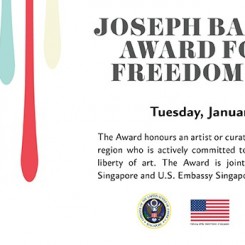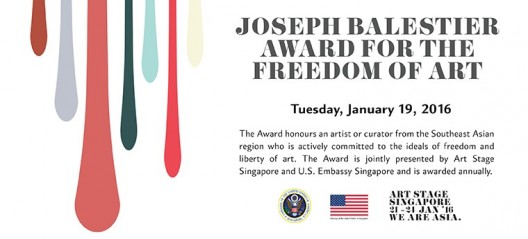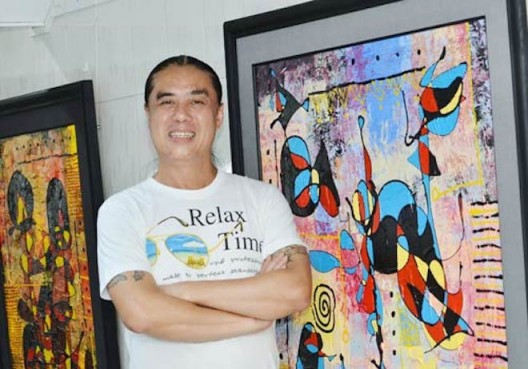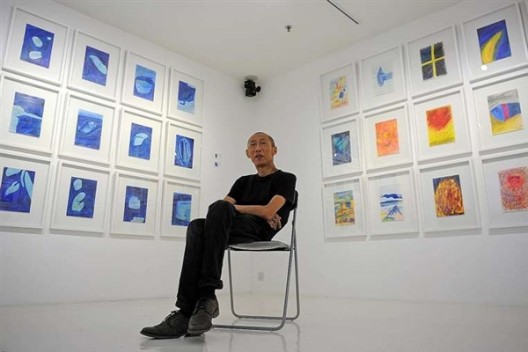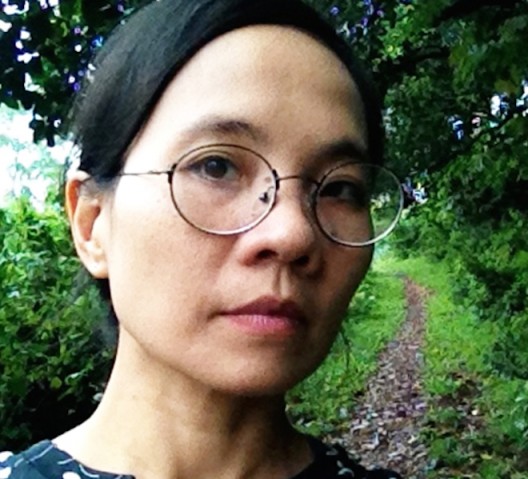[press release]
Art Stage Singapore and the U.S. Embassy Singapore have named three regional artists as finalists for the 2016 Joseph Balestier Award for the Freedom of Art.
Aye Ko (Myanmar), Lee Wen (Singapore) and Nguyen Trinh Thi (Vietnam) will vie for the top honor, which recognizes an artist or curator from Southeast Asia who is actively committed to the ideals of liberty and freedom of expression, and through his or her work, continually seeks to express these ideals. This year’s recipient will be awarded a prize of USD $15,000.
The three finalists were selected by the Joseph Balestier Award for the Freedom of Art 2016 Jury from a list of Southeast Asian artists and curators nominated by regional art professionals and experts. The Jury is led by Dr. Ute Meta Bauer, Director of Singapore^ Centre for Contemporary Art (CCA); Ms. Luckana Kunavichayanont, Director, Bangkok Art and Culture Centre (BACC) and Mr. Enin Supriyanto, an independent art curator and writer from Indonesia.
The winner of the Joseph Balestier Award for the Freedom of Art 2016 will be jointly selected by U.S. Ambassador to Singapore Kirk Wagar and Lorenzo Rudolf, Founder and President, Art Stage Singapore, and will be announced at an award ceremony on January 19, 2016.
Aye Ko’s performance art has established his position as one of Myanmar’s most high-profile artists. For the past two decades, his practice has interrogated the meaning of politics and nature. For many years, he has employed his body-based performances in criticizing Myanmar’s authoritarian regime.
Lee Wen is a multidisciplinary artist engaging with themes of social identity. Best known for his Yellow Man series, he is one of the pioneers of performance art in Singapore, where his chosen mode of artistic expression was subjected to a decade-long proscription beginning in 1994.
Nguyen Trinh Thi’s works examine issues centering on society and the history of her home country, Vietnam. Her films highlight the quotidian and issues faced by members of silenced, marginalized and oft-dismissed communities in Vietnam. Through such portrayals, Nguyen challenges the state of public discourse and pushes the boundaries of censorship laws in Vietnam.
“Last year’s inaugural Joseph Balestier Award for the Freedom of Art established an important new forum in Southeast Asia for recognizing artistic freedom of expression and fostering a dialogue about the purpose of art. The three finalists – Aye Ko, Lee Wen and Nguyen Trinh Thi -all have shown bravery in their works and all have taken personal risks in speaking truth to power, rm honored to host the 2016 awards and look forward to announcing the winner on January 19,” said U.S. Ambassador to Singapore, Kirk Wagar.
“Art and artists need – from the outside and from the inside – space, openness and freedom to make legitimate inquiries about ourselves, for vision and inspiration. Contemporary art is an attitude, a statement, and a commitment; and the three finalists for the Joseph Balestier Award for the Freedom of Art 2016 – Aye Ko, Lee Wen and Nguyen Trinh Thi – clearly represent what it means to be strong contemporary artists. Artists are seismographs of society. And we have to ask ourselves: what is the mirror which we can look at worth to us? Without it, our society would be a cold, sad, grey, dreary and wretched technocracy. Therefore, in our own interest, let^ give to art the freedom it needsl^ says Mr. Lorenzo Rudolf, Founder and President, Art Stage Singapore.
The Joseph Balestier Award for the Freedom of Art was inaugurated in 2015 and is named after Joseph Balestier, the first American diplomat accredited to Singapore, appointed Consul General of the United States to Singapore in 1836, and a relative of American patriot Paul Revere. It is jointly organized by Art Stage Singapore and the U.S. Embassy Singapore. Art Stage Singapore, the flagship fair of Southeast Asia will take place from 21 to 24 January 2016 at the Marina Bay Sands Expo and Convention Centre.
About Art Stage Singapore
Art Stage Singapore is the leading Asian art fair connecting the world to the best of Asian contemporary art. With a deep understanding of Asia’s dynamic visual arts scene, Art Stage Singapore presents the diversity of contemporary art rising from the region. Presenting handpicked galleries from Asian and Western countries that complement each other, Art Stage Singapore promotes dialogue not only between Asia and the West but amongst the countries of the Asianregion as well. Art Stage Singapore’s consistent support of Asian galleries, artists and art practices positions the fair as the region’s international voice, representing the interests of Asian contemporary art in the global arena. More than a market platform, Art Stage Singapore is the definitive rendezvous point for discourse and exchange of ideas on the ever-evolving Asian art scene. For more information, visit http://artstagesingapore.com.
About the U.S. Embassy
The U.S. Embassy Singapore consists of 19 U.S. Federal Government agencies working in Singapore
About Joseph Balestier
Joseph Balestier was the first Consul General of the United States of America to Singapore, serving between 1836-1852. His wife, Maria Revere Balestier, was the daughter of American patriot Paul Revere. Balestier was officially recognised as the Consul at Singapore in June 1837, when ships from America were permitted by the British East India Company to trade on an equal footing.
In the mid-1830s, Joseph Balestier was one of the first men to own a 1,000-acre sugar-cane plantation, known as the Balestier Plantation located on the Balestier Plain. Today, the centrally located Balestier Road runs alongside what used to be his sugar estate in Singapore.
His wife, Maria Revere Balestier, was the daughter of Paul Revere, the revolutionary hero during the American War of Independence whose famed midnight ride helped secure America’s freedom. She and her husband donated the famed Revere Bell to St. Andrew’s Church in 1843. It is now part of the permanent exhibition of the Singapore History Gallery at the National Museum of Singapore.
Joseph Balestier Award for the Freedom of Art 2016 Finalist Biographies
Aye Ko, artist (Myanmar)
Aye Ko was born in 1963, in Pathein, Myanmar. He learned about realism painting from a private teacher, the artist Min Soe, in 1986. From 1988 – 1990, as a young man passionate for his country, he participated in the student revolution and underground movements for Democracy. He was subsequently investigated and arrested in 1990 for his participation in the movements. After being tortured for 1 month and 3 days, he received a 3-year prison sentence. Aye Ko was also sent for solitary confinement for one year under chain as he had tried to break out of prison. After this sentence, he continued with the arts and became a full time artist. In 2008, he founded the New Zero alternative art space, and organized new exhibits and activities.
The purpose of New Zero Art Space is to promote a group of people who enjoy new and modern art. When the art trend is turned toward contemporary, New Zero Art Space encouraged its artists and young generation by providing several educational platforms for contemporary and conceptual arts. As New Zero Art Space, he included a residency program, art education programs, workshops, exhibitions, exchange programs and other art activities since it was founded, from 2008 till now. Recently in 2015, he extend New Zero Art Space to the New Zero Art Village near Yangon, and founded an art school for the children and youths in the village and surrounding community.
In 1999, he did his first performance piece at the Asia Topia Performance Art Festival in Thailand, followed by his second performance piece at Chaung Tha Beach in Myanmar. However, Myanmar law on performance art was harsh, and he was sentenced to 3-months in prison for breaking the law. He appealed the sentence and won. Since then, Aye Ko and New Zero Art Space have organized many underground performance art activities. Though performance art is still largely unrecognized, he tries to spread awareness for performance art through his interaction with local and international media.
As an artist he practices painting, installations, performance art and other new media including video, sound and photography. He started the New Wave arts and literature magazine in 2009, and participated in several international art events as an artist and curator. In 2015, he held his 11th solo exhibition in Lyon, France, and has participated in over a hundred art events in Myanmar over the years. He was awarded by the Asia Cultural Council in 2005.
Lee Wen, artist (Singapore)
Lee Wen is a fine art artist working primarily in performance art, or mixed media installation. Associated with Artists Village – an important avant-garde artists’ group in Singapore – since 1989, he later forged a distinguished individual practice as he gained international recognition.
Lee has been represented at various international art events such as the Taiwan 5th Asian Art Biennale, (Taichung, Taiwan, 2015), the Busan Biennale (South Korea, 2004), the 3rd Asia Pacific Triennial (Brisbane, 1999), the Sexta Bienal de La Habana (1997), the Kwangju Biennial (1995), the 4th Asian Art Show (Fukuoka, 1994), and the National Review of Live Art (Scotland, 2004 and 2005). Lee’s installations and performances often expose and question the ideologies and value systems of individuals as well as social structures.
He had been an Associate Artist with the Substation and an honorary member of (until 2007) and actively worked with the Artists Village in Singapore (1989 to 2010). He has been participating with Black Market International, an international performance art group, since 2000. In 2003, Lee began ‘The Future of Imagination’,an international performance art festival which includes forum, documentation and presentation of performance art in Singapore. He initiated the Independent Archive Ltd, which consists of a reference library and a collection of archival material pertaining to focus on ephemeral contemporary art including performance art and installation art in Singapore and the regional countries of South East Asia . His works have been collected by the Singapore Art Museum and National Art Gallery, Singapore, Mori Art Museum, Tokyo, Fukuoka Asian Art Museum, Fukuoka, Queensland Art Museum, Brisbane and ARTUR, Istanbul.
Lee was awarded the Cultural Medallion in 2005. Performance Studies International (PSi) conferred the Artist, Scholar, Activist ( A.S.A.) award to Lee in 2014.
Nguyen Trinh Thi, artist (Vietnam)
Nguyen Trinh Thi is a Hanoi-based independent filmmaker and video/media artist. Her diverse practice has consistently investigated the role of memory in the necessary unveiling of hidden, displaced or misinterpreted histories; and examined the position of artists in the Vietnamese society.
Nguyen studied journalism, photography, international relations and ethnographic film in the United States. Her films and video art works have been shown at festivals and art exhibitions across Asia, Europe, and the USA – including Jeu de Paume, Paris; CAPC musee d’art contemporain de Bordeaux; the Lyon Biennale 2015; Asian Art Biennial 2015, Taiwan; Fukuoka Asian Art Triennial 2014; Singapore Biennale 2013; Jakarta Biennale 2013; Oberhausen International Film Festival; Bangkok Experimental Film Festival; Artist Films International; DEN FRIE Centre of Contemporary Art, Copenhagen; and Kuandu Biennale, Taipei.
Nguyen is founder and director of Hanoi DOCLAB, an independent center for documentary film and the moving image art in Hanoi since 2009.

